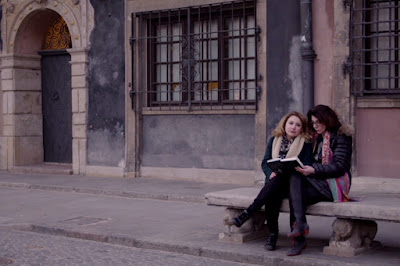The thing you're most likely to remember about NANA, both the movie and its main character, is the wonderful sense of humor possessed by the grandmother of the title: Maryla Michalowski-Dyamant, a truly grand old lady who was very smart, very human and very humane. One of the first things Nana tells us, puffing away, is this: "I survived Auschwitz; I'll survive cigarettes." Not long into this remarkable documentary, made by Nana's own granddaughter Serena Dykman (shown below) -- I found myself thinking, "This is one of the best, most explicit, deep and profound explanations by a Holocaust survivor that I have yet encountered." By movie's end, I felt even more convinced of this.
Once Ms Dykman put out word that she was making a documentary about her grandmother (shown above and below), much to her surprise she began receiving information from all over about the many filmed interviews featuring her grandmother -- who turns out to have been one of the earliest, most frequent and (for my money) the best public-speaker/survivor of the Holocaust that has existed. In addition to marrying and raising a family, Maryla dedicated her life to educating future generations on the importance of tolerance to ensure that what happened to European Jews in World War II would never happen again.
Ms Dykman has used wisely and well these many interviews in her documentary so that we come to know and appreciate Nana about as well as we possibly could over a mere 100 minutes and we come to love this woman, understand her and feel for what she endured -- while especially being cognizant of everything from survivor guilt to the post-Holocaust antisemitism this woman had to endure.
Late in the film she explains to one of her interviewers that the day she was finally "liberated" from the Nazis was the saddest of her life because the liberators themselves were clearly antisemitic -- and because there was no one still alive to be happy for her and welcome her back home. Who among us has ever experienced not only the horror of the Holocaust but, on top of that, this kind of "liberation"?
Over and over again, thanks to the keen intelligence, humor and humanity of this woman, we're treated to her ideas and remembrances, and there is not a one of them not worth hearing. Little wonder people whom Nana had met over the years still remember her so fondly and well.
Along the way we learn a little of the life of the filmmaker's mother, Alice (above, left, and below, right), as well as that of Serena's herself. At one very interesting point an interviewer asks Serena when she first knew and understood the Holocaust. The young woman makes a very clear distinction between the "knowing" of something and the later "understanding" of it.
Grandmother's history is, in its way, a knockout of a tale (for a time in Auschwitz, as someone who could speak Polish, German and even Latin, she acted as "translator" for a certain Dr. Joseph Mengele!), and it is a story that directly addresses our current (and seemingly forever) Holocaust deniers. When she talks about being asked by certain young people how, as a Jew, she could even have survived the camps, you may find your blood beginning to heat up. (She credits her survival mostly to luck.)
The movie may be a bit longer than necessary, especially when, at the finale, we hear everyone thanking Nana over and over again. Not that you will disagree with those thanks. Also, showing Nana reading from her diary/memoir, and then having either mom or granddaughter read the same passage may help make the documentary trans-generational, but it doesn't add much to the package itself, which is mostly--and rightly--Nana's show.
From First Run Features, Nana opens this Friday, April 13, in New York City at the Cinema Village, and, though I do not see any other theatrical playdates scheduled as yet, coming as it does via FRF, there will surely be digital and DVD opportunities down the road.













No comments:
Post a Comment